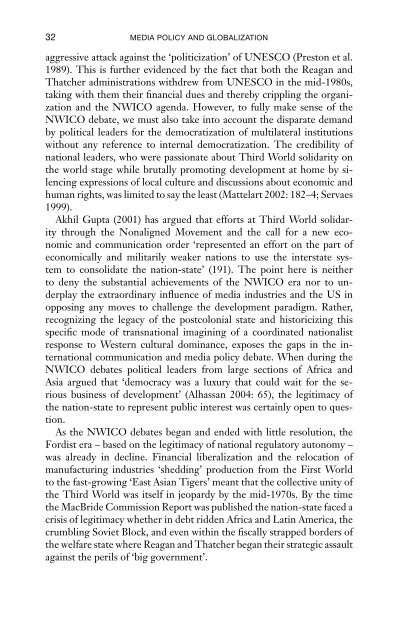Media Policy and Globalization - Blogs Unpad
Media Policy and Globalization - Blogs Unpad
Media Policy and Globalization - Blogs Unpad
Create successful ePaper yourself
Turn your PDF publications into a flip-book with our unique Google optimized e-Paper software.
32 MEDIA POLICY AND GLOBALIZATION<br />
aggressive attack against the ‘politicization’ of UNESCO (Preston et al.<br />
1989). This is further evidenced by the fact that both the Reagan <strong>and</strong><br />
Thatcher administrations withdrew from UNESCO in the mid-1980s,<br />
taking with them their financial dues <strong>and</strong> thereby crippling the organization<br />
<strong>and</strong> the NWICO agenda. However, to fully make sense of the<br />
NWICO debate, we must also take into account the disparate dem<strong>and</strong><br />
by political leaders for the democratization of multilateral institutions<br />
without any reference to internal democratization. The credibility of<br />
national leaders, who were passionate about Third World solidarity on<br />
the world stage while brutally promoting development at home by silencing<br />
expressions of local culture <strong>and</strong> discussions about economic <strong>and</strong><br />
human rights, was limited to say the least (Mattelart 2002: 182–4; Servaes<br />
1999).<br />
Akhil Gupta (2001) has argued that efforts at Third World solidarity<br />
through the Nonaligned Movement <strong>and</strong> the call for a new economic<br />
<strong>and</strong> communication order ‘represented an effort on the part of<br />
economically <strong>and</strong> militarily weaker nations to use the interstate system<br />
to consolidate the nation-state’ (191). The point here is neither<br />
to deny the substantial achievements of the NWICO era nor to underplay<br />
the extraordinary influence of media industries <strong>and</strong> the US in<br />
opposing any moves to challenge the development paradigm. Rather,<br />
recognizing the legacy of the postcolonial state <strong>and</strong> historicizing this<br />
specific mode of transnational imagining of a coordinated nationalist<br />
response to Western cultural dominance, exposes the gaps in the international<br />
communication <strong>and</strong> media policy debate. When during the<br />
NWICO debates political leaders from large sections of Africa <strong>and</strong><br />
Asia argued that ‘democracy was a luxury that could wait for the serious<br />
business of development’ (Alhassan 2004: 65), the legitimacy of<br />
the nation-state to represent public interest was certainly open to question.<br />
As the NWICO debates began <strong>and</strong> ended with little resolution, the<br />
Fordist era – based on the legitimacy of national regulatory autonomy –<br />
was already in decline. Financial liberalization <strong>and</strong> the relocation of<br />
manufacturing industries ‘shedding’ production from the First World<br />
to the fast-growing ‘East Asian Tigers’ meant that the collective unity of<br />
the Third World was itself in jeopardy by the mid-1970s. By the time<br />
the MacBride Commission Report was published the nation-state faced a<br />
crisis of legitimacy whether in debt ridden Africa <strong>and</strong> Latin America, the<br />
crumbling Soviet Block, <strong>and</strong> even within the fiscally strapped borders of<br />
the welfare state where Reagan <strong>and</strong> Thatcher began their strategic assault<br />
against the perils of ‘big government’.

















